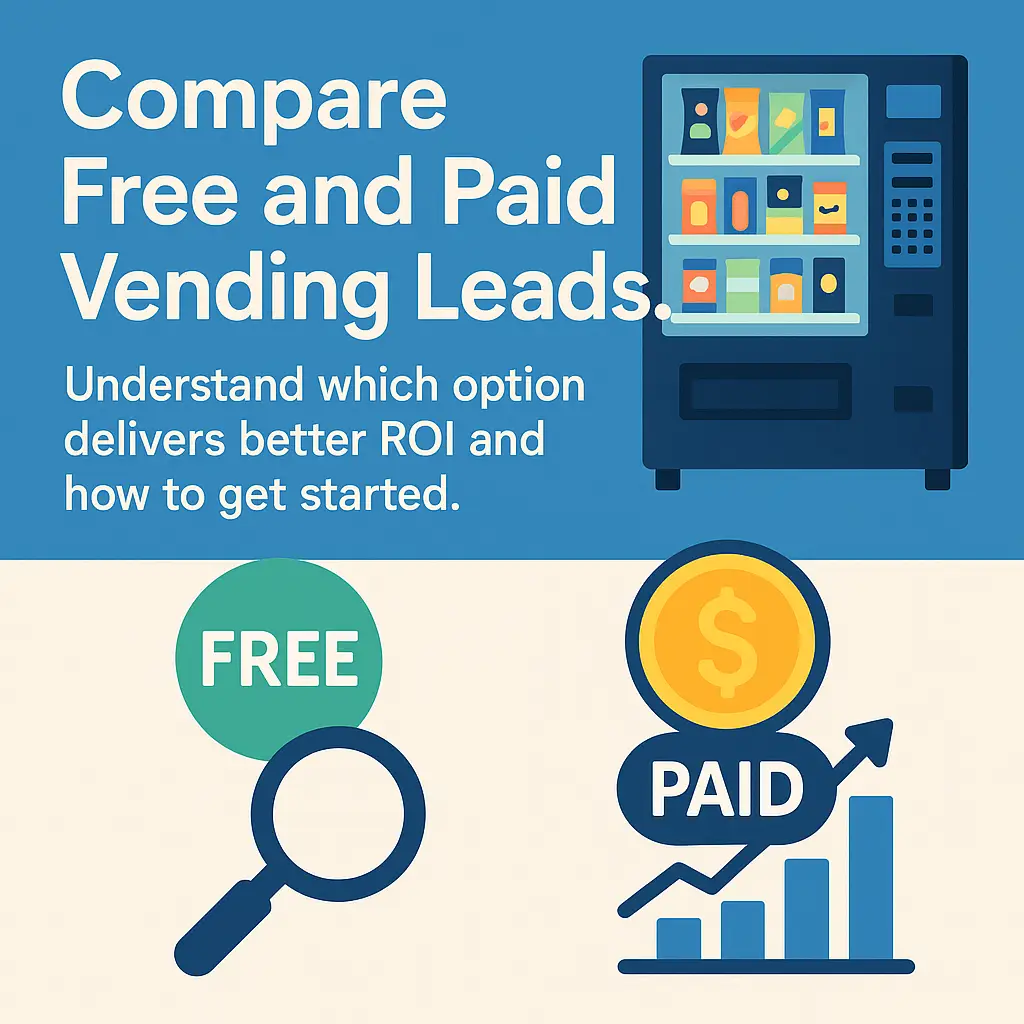Free Vending Leads vs Paid: What Works Best?
Compare free and paid vending leads. Understand which option delivers better ROI and how to get started.
Back to Vending Machine Locators ResourcesCompare free and paid vending leads. Understand which option delivers better ROI and how to get started.
Back to Vending Machine Locators ResourcesStart your 30-day free trial and get instant SMS and email alerts whenever a local business needs vending service. These are real location leads to help you grow your route — you decide which ones to buy, no obligations or contracts.
![]() Paid leads save time by targeting qualified businesses
Paid leads save time by targeting qualified businesses
![]() Free leads often require more follow-up and research
Free leads often require more follow-up and research
![]() Lead quality directly affects vending route success
Lead quality directly affects vending route success
30 days free, then $39 / month.
No Commitment. Cancel Anytime.

When you’re growing a vending business, your choice of lead sources can make all the difference. Free vending leads might seem attractive at first glance, but they often require much more time and legwork. These leads tend to come from general interest forms, old business lists, or unverified contacts. The result? Low conversion rates and a lot of time spent chasing businesses that may not be serious.
On the other hand, paid vending leads offer more control and efficiency. High-quality lead platforms pre-qualify businesses that actively want vending services and match them with operators in their area. Although there's a cost to access these leads, the return can be far greater in terms of closed deals, reduced driving time, and route optimization. Paying for leads also typically gives you access to decision-maker contact info, eliminating the guesswork in prospecting.
Lead quality directly impacts your route profitability. Securing just a few solid locations with steady foot traffic is more valuable than dozens of unresponsive free leads. In a competitive market, time is your most valuable resource—and paid leads can minimize wasted effort significantly.
It’s also worth noting that not all paid leads are created equal. Some services might dump you into a list that’s shared with several operators, while others offer exclusivity and better vetting. Be sure to research where the leads come from, what info is provided, and what support (e.g., customer service or refund policies) they include.
For vendors just starting out, combining both strategies can be effective. Use free leads to practice your cold outreach and develop pitch skills, while leveraging paid leads to accelerate serious expansion with less risk.
If you're new to vending outreach, see our guide on approaching businesses about vending machines. Also, check out this article on vending as a business for retirees for insights about long-term growth potential.
Vending Exchange connects vending operators with real businesses actively looking for vending services—including traditional machines, AI coolers, and office coffee. Get instant SMS and email alerts when new opportunities are available in your area. No contracts or monthly fees—just buy the leads you want. Start your free 30-day trial today and grow your vending business on your terms.
Paid leads usually deliver higher ROI due to better targeting and faster conversions.
Yes, but they often require more effort, research, and follow-up before securing locations.
Evaluate based on exclusivity, detail of business info provided, and lead source transparency.
Yes, most free leads need cold outreach and may not be actively seeking vending services.
Poorly targeted leads, outdated contact info, and non-serious prospects are common issues.
Stick with reputable platforms that verify leads and offer clear payment, contact, and refund policies.
Lack of contact info, no interest in vending, or generic location types with low foot traffic.
Rarely—they are typically generic business lists without verified vending interest.
Often within days, depending on how quickly you respond and make contact with the business.
Yes, using both can help new operators test outreach approaches and build experience.